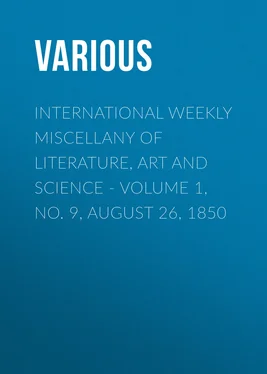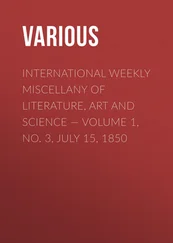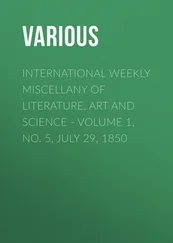Various - International Weekly Miscellany of Literature, Art and Science - Volume 1, No. 9, August 26, 1850
Здесь есть возможность читать онлайн «Various - International Weekly Miscellany of Literature, Art and Science - Volume 1, No. 9, August 26, 1850» — ознакомительный отрывок электронной книги совершенно бесплатно, а после прочтения отрывка купить полную версию. В некоторых случаях можно слушать аудио, скачать через торрент в формате fb2 и присутствует краткое содержание. Жанр: foreign_antique, periodic, foreign_edu, на английском языке. Описание произведения, (предисловие) а так же отзывы посетителей доступны на портале библиотеки ЛибКат.
- Название:International Weekly Miscellany of Literature, Art and Science - Volume 1, No. 9, August 26, 1850
- Автор:
- Жанр:
- Год:неизвестен
- ISBN:нет данных
- Рейтинг книги:4 / 5. Голосов: 1
-
Избранное:Добавить в избранное
- Отзывы:
-
Ваша оценка:
- 80
- 1
- 2
- 3
- 4
- 5
International Weekly Miscellany of Literature, Art and Science - Volume 1, No. 9, August 26, 1850: краткое содержание, описание и аннотация
Предлагаем к чтению аннотацию, описание, краткое содержание или предисловие (зависит от того, что написал сам автор книги «International Weekly Miscellany of Literature, Art and Science - Volume 1, No. 9, August 26, 1850»). Если вы не нашли необходимую информацию о книге — напишите в комментариях, мы постараемся отыскать её.
International Weekly Miscellany of Literature, Art and Science - Volume 1, No. 9, August 26, 1850 — читать онлайн ознакомительный отрывок
Ниже представлен текст книги, разбитый по страницам. Система сохранения места последней прочитанной страницы, позволяет с удобством читать онлайн бесплатно книгу «International Weekly Miscellany of Literature, Art and Science - Volume 1, No. 9, August 26, 1850», без необходимости каждый раз заново искать на чём Вы остановились. Поставьте закладку, и сможете в любой момент перейти на страницу, на которой закончили чтение.
Интервал:
Закладка:
MR. G.P.R. JAMES has taken a cottage at Jamaica, Long Island, and is domiciliated as an American—we hope for a long time. He has made troops of friends since his arrival here, and is likely to be as popular in society as he has long been in literature. We are sure we communicate a very pleasing fact when we state that it is his intention to give in two or three of our principal cities, during the autumn and fall, a series of lectures—probably upon the chivalric ages, with which no one is more profoundly familiar, and of which no one can discourse more wisely or agreeably. His abilities, his reputation, and the almost universal acquaintance with his works, insure for him the largest success. We are indebted to no other living author for so much enjoyment, and by his proposed lectures he will not only add to our obligations, but furnish an opportunity to repair in some degree the wrong he has suffered from the imperfection and injustice of our copyright system.
"THE LIFE, CHARACTER, AND GENIUS OF EBENEZER ELLIOTT," is a volume by January Searle, author of Leaves from Sherwood Forest , &c., who knew the corn-law rhymer well, and has been enabled to give very characteristic sketches, original descriptions, correspondence, &c. There are in it many judiciously selected specimens of Elliott's poems, prose productions, and lectures. Mr. Searle observes of him, that "he was cradled into poetry by human wrong and misery; and was emphatically the bard of poverty—singing of the poor man's loves and sorrows, and denouncing his oppressors." Again: "He has one central idea—terrible and awful in its aspect, although beautiful and beneficent in spirit—before which he tries all causes, and men, and things. It is the Eternal Idea of Right; his synonyme of God. And this idea is perpetually present in his mind, pervades all his thoughts, will not be shuffled nor cheated, but demands a full satisfaction from all violators of it."
THE LATE MRS. OSGOOD was in a very remarkable degree respected and beloved by those who were admitted to her acquaintance. Without envy or jealousy, or any of the immoralities of the intellect which most commonly beset writers of her sex, she occasioned no enmities and was a party to none, but was regarded, especially by the literary women of this country, with a feeling of tenderness and devotion probably unparalleled in the annals of literature or of society. Immediately after her death, therefore, a desire was manifested to illustrate the common regard for her by some suitable testimonial, and upon consultation, it was decided to publish a splendid souvenir, to consist of the gratuitous contributions of her friends, and with the profits accruing from its sale to erect a monument to her memory in the cemetery of Mount Auburn. This gift book, edited by Mrs. Osgood's most intimate friend, Mary E. Hewitt, will be published by Mr. Putnam, on the first of October, under the title of The Cairn , and it will contain original articles by George Aubrey, Lord Bishop of Jamaica: the Right Rev. George W. Doane, the Right Rev. Alonzo Potter, the Hon. R.H. Walworth, the Hon. J. Leander Starr, the Rev. C.S. Henry, D.D., G.P.R. James, Esq., N.P. Willis, Esq., W. Gilmore Simms, Esq., Bayard Taylor, Esq., J.H. Boker, Esq., Alfred B. Street, Esq., R. H. Stoddard, Esq., Miss Fredrika Bremer, Mrs. Sigourney, Mrs. Oakes Smith, Mrs. Embury, Mrs. Lewis, Mrs. Neal, Mrs. Willard, Mrs. Whitman, Miss Lynch, Miss Hunter, Miss Cheesebro', and indeed nearly all the writers of her sex who have attained any eminence in our literary world. The volume will be illustrated with nine engravings on steel, by Cheney and other eminent artists.
THE REV. WALTER COLTON has just published through A.S. Barnes & Co. "Three Years in California," a journal of experiences and observations in the gold region, from the period when it first attracted the attention of the Atlantic cities. Mr. Colton was some time alcade of Monterey, and he had in every way abundant opportunity to acquire whatever facts are deserving of preservation in history. His "Ship and Shore," "Constantinople and Athens," "Deck and Port," and other works, have illustrated his genial temper, shrewdness, and skill in description and character writing; and this book will increase his reputation for these qualities. It contains portraits of Capt. Sutter, Col. Fremont, Mr. Gwin, Mr. Wright, Mr. Larkin, and Mr. Snyder, a map of the valley of the Sacramento, and several other engravings, very spirited in design and execution.
MR. GEORGE STEPHENS, author of the " Manuscripts of Erdely ," has been struck by ill health and reduced to poverty, and an amateur play has been prepared for his benefit at the Soho Theater. He wrote "The Vampire," "Montezuma," and "Martinuzzi."
The Gallery of Illustrious Americans, conducted by Mr. Lester, continues with every number to increase in interest. The work is designed to embrace folio portraits, engraved by Davignon, from daguerreotypes by Brady, of twenty-four of the most eminent American citizens who have lived since the time of Washington. The portraits thus far have been admirable for truthfulness and artistic effect. It may be said that the only published pictures we have, deserving to be called portraits, of the historian Prescott, or Mr. Calhoun, or Colonel Fremont, are in this Gallery. The great artist, naturalist, and man of letters, Audubon, is reflected here as he appears at the close of the battle, receiving the reverence of nations and ages. In the biographical department Mr. Lester has evinced very eminent abilities for this kind of writing. He seizes the prominent events of history and the strong points of character, and presents them with such force and fullness, and happy combination, as to make the letter-press as interesting and valuable as the engraved portion of the work. We are pleased to learn that the Gallery is remarkably successful. No publication of equal splendor and expensiveness has ever before been so well received in this country. The cost of it is but one dollar per number, or twenty dollars for the series of twenty-four numbers. It is now half completed.
M. Max Schlesinger, author of "The War in Hungary, in 1848-9,"—a work which, from what we read of it in the foreign journals, is much the most striking and attractive of all that have appeared upon its subject in English,—is described in the Athenæum , as by birth a Hungarian, by the accidents of fortune a German. For some time a resident in Prague, and more recently settled in Berlin, he has had excellent opportunities of seeing the men and studying the questions connected both in the literary and political sense with the present movement of ideas and races in Eastern Europe. His acquaintance with the aspects of nature in his native land—his knowledge of the peculiar character of its inhabitants, their manners, modes of thought and habits of life—his familiarity with past history—his right conception of the leading men in the recent struggle—are all vouched for as "essentially accurate" by no less an authority than Count Pulszky. It would be an injustice merely to say that M. Schlesinger has given in an original and picturesque way a general view of the course of events in the late war, more complete and connected than is afforded in any account hitherto presented to the public. He has done more: he has enabled the German and English reader to understand the miracle of a nation of four or five millions of men rising up at the command of a great statesman, and doing successful battle with the elaborately organized power of a first-class European state, shaking it to its very foundations, and contending, not without hope, against two mighty military empires,—until the treachery from within paralyzed its power of resistance.
Dr. Mayo's new novel, "The Berber, or the Mountaineer of the Atlas," published by Putnam, promises to be scarcely less popular than his "Kaloolah." The Evening Post says of it: "Kaloolah was a sprightly narrative of the wanderings of a Yankee, who seemed to combine in his person the characteristics of Robinson Crusoe with those of Baron Munchausen; but the Berber professes to be nothing more than a novel; or, as the author says in his preface, his principal object has been to tell an agreeable story in an agreeable way. In doing so, however, an eye has been had to the illustration of Moorish manners, customs, history, and geography; to the exemplification of Moorish life as it actually is in Barbary in the present day, and not as it usually appears in the vague and poetic glamour of the common Moorish romance. It has also been an object to introduce to the acquaintance of the reader a people who have played a most important part in the world's history, but of whom very few educated people know anything more than the name. As Dr. Mayo has traveled extensively over the regions he describes, we presume that his descriptions may be taken as true. His account of the Berbers, a tribe of ancient Asiatic origin, who inhabit a range of the Atlas, and who live a semi-savage life like the Arabs, is minute, and to the intelligent reader quite as interesting as the more narrative parts of the work. It is, perhaps, the best evidence of the merits of the book, that the whole first edition was exhausted by orders from the country before the first number had appeared in the city."
Читать дальшеИнтервал:
Закладка:
Похожие книги на «International Weekly Miscellany of Literature, Art and Science - Volume 1, No. 9, August 26, 1850»
Представляем Вашему вниманию похожие книги на «International Weekly Miscellany of Literature, Art and Science - Volume 1, No. 9, August 26, 1850» списком для выбора. Мы отобрали схожую по названию и смыслу литературу в надежде предоставить читателям больше вариантов отыскать новые, интересные, ещё непрочитанные произведения.
Обсуждение, отзывы о книге «International Weekly Miscellany of Literature, Art and Science - Volume 1, No. 9, August 26, 1850» и просто собственные мнения читателей. Оставьте ваши комментарии, напишите, что Вы думаете о произведении, его смысле или главных героях. Укажите что конкретно понравилось, а что нет, и почему Вы так считаете.












